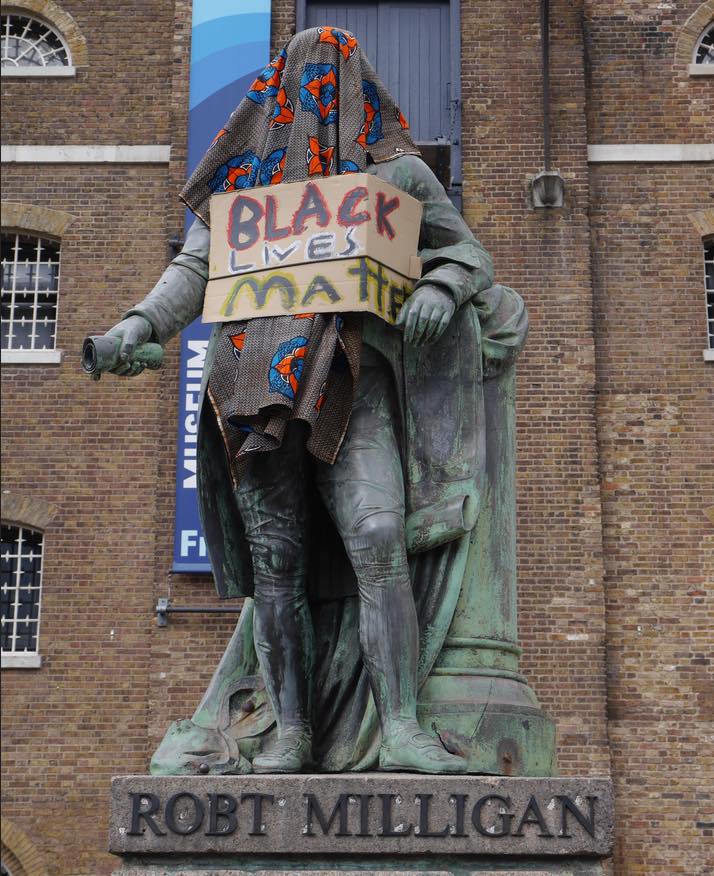
At the outset, let me admit to a personal prejudice, in the spirit of the confession of sins, which seems to characterise many of my countrymen these days. I have been, and indeed remain, somewhat anti-statue.
The reasons for this come from both faith and history.
My national history (I am a Scot) includes statue-demolishing ancestors such as John Knox. These iconoclasts rejected the corruption of the Roman church, and their bells-and-smells worship which operated through the senses, for a simpler, more austere worship that focussed on the ideas contained in Scripture. The national Scottish response to this was a flowering of intellect, study, thought and debate that transformed a small, impoverished nation and placed it at the cutting edge of human endeavour. So much so that, centuries later, books are written on how the Scots invented the modern world. Thus, our national statue-smashing episode worked to improve our society. It can be good to smash the symbols of corruption.
In Scripture, God's laws were thundered from a mountaintop by our Lord in person. They included:
Thou shalt not make unto thee any graven image, or any likeness of any thing that is in heaven above, or that is in the earth beneath, or that is in the water under the earth.
This caused a long-term decline in the monumental statue business that lasted millennia.
So, in short, I am naturally sympathetic to statue-smashers of various types — when, that is, their cause is just and their reason is true.
And yet, the events of this last week have left me deeply concerned. Why should this be?
The lack of truth is one reason. Our nation came very late to the slave trade, a trade almost as old as mankind. It quickly developed a distaste for that industry; a distrust that grew in Britain's established churches and the Methodist chapels that had separated from them. The first blow was struck in 1772, in the case of Somerset v Stewart. Stewart, a Scots sea captain and customs officer, returned from the American Colonies to England with a slave that he had purchased. The slave, Somerset, escaped, was taken in and befriended by a church congregation, and was baptised into the Christian faith. He thus found himself far from friendless when he was later recaptured. The whole matter was brought before the courts.
William Murray, the First Earl of Mansfield, a Scottish nobleman, was Lord Chief Justice of the Court of King's Bench at the time. He found that:
The state of slavery is of such a nature, that it is incapable of now being introduced by Courts of Justice upon mere reasoning or inferences from any principles, natural or political; it must take its rise from positive law; the origin of it can in no country or age be traced back to any other source: immemorial usage preserves the memory of positive law long after all traces of the occasion; reason, authority, and time of its introduction are lost; and in a case so odious as the condition of slaves must be taken strictly, the power claimed by this return was never in use here; no master ever was allowed here to take a slave by force to be sold abroad because he had deserted from his service, or for any other reason whatever; we cannot say the cause set forth by this return is allowed or approved of by the laws of this kingdom, therefore the black must be discharged.
He thus effectively ruled that Britain was free and that no man or woman setting foot on this land could be held in slavery.
This was the first step on the road that led to the Slavery Abolition Act of 1833 (repealed in Tony Blair's first term in favour of international "human rights"). The 1833 Act abolished slavery in the British Empire, freeing more than 800,000 enslaved Africans. Thereafter, the Royal Navy West African Squadron stamped out slave transportation from Africa to the Americas.
The cost of this came to 5% of British gross domestic product at the time (5% of UK GDP today would be around £140,000,000,000). The loan taken out to finance the effects of this repeal was only paid off by the British taxpayers in 2015. This puts most Britons in the position of being able to claim to have personally financially contributed to the ending of slavery.
To quote Irish historian William Lecky:
The unweary, unostentatious, and inglorious crusade of England against slavery may probably be regarded as among the three or four perfectly virtuous pages comprised in the history of nations.
So, with such a history of slavery across the globe, and with Britain being so long opposed to this practice, what is going on with the destruction of statues? What is going on is an attack.
The far-left activists of Black Lives Matter understand what George Orwell understood:
The most effective way to destroy people is to deny and obliterate their own understanding of their history.
And, seeking to destroy the British, they wish to paint our history as a shameful thing, which we must never cease to apologise for, nor omit to make reparations for (5% of our national wealth not being enough). Furthermore, it seeks to divide the people of this island based on skin tone. It tells those with dark skin to consider themselves perpetual victims. And victimhood is a sentiment even more toxic to human thriving than shame.
But it’s not merely an attack to demoralise and divide us. It seeks something more. It seeks power. Once again, Orwell saw this coming:
Who controls the past controls the future. Who controls the present controls the past.
By controlling the narrative today, BLM seek to control the present political environment. This gives them power to shape the past via state-regulated education, state-enforced hate crime legislation and state-controlled media. All of this changes who we are as a people in months and years to come. It is the ideas of the Cabinet Office Nudge Unit, only played out on a vast scale.
This assault seeks nothing less than the destruction of the British as a viable, independent nation, able to shape world events as we did in 1772 and 1833 and on so many other occasions. Instead, we will be a house divided against itself; unsure and unsteady.
Why has this attack been so successful? In part, because it is not founded on nothing. There are many failings in our historical past, albeit fewer than are found in our benighted present.
The trick being pulled by the radical Left is the old one of the faulty comparison. Our history is being compared not to other nations', but to some unstated-but-assumed perfection.
In this fallen world, beset by human failings, utopia is unknown. But the Left has perceived a weakness in that part of British culture that still strives for goodness and values righteousness. It perceives, rightly, that our nation cannot perfectly live up to its own values. Using the techniques of critical theory, these failings are brutally presented to us and we are invited to kneel.
We should not do so.
Instead, we should question: “We fall short? Compared to what?”
The standard that was thundered from a mountain by the Lord? If that is the standard, then we fall far short for sure, along with every other nation. But, of course, that is not the standard the Left employs. As soon as this deception is revealed, the attack starts to crumble.
Is the comparison to be those states run on socialist principles, where 160,000,000 people were murdered in the twentieth century alone, not counting the wars? Or is it to be post-colonial Africa, with its corruption, poverty and genocide? Or perhaps it is to be India, as framed by the revered Gandhi — where 18 million exist in slavery today and where rape is reaching epidemic proportions?
Against any human benchmark, Britain has nothing to be ashamed of. Against the standard thundered from the mountain, we have faults aplenty.
The importance of a standard lodged above human manipulation is this: it allows people to co-operate against evils and provides a unifying idea based not on power but on truth. This is a foundation that cannot be used and controlled, but rather directs us to co-operate and serve one-another.
BLM do not care about truth. They do not care about black lives either, else they would smash the abortion clinics, not the electrical appliance stores. They seek only power.
In resisting their attack, the sword of truth is our weapon. We must become skilled in its use.
Main Image: Chris McKenna (CC BY-SA 4.0)

